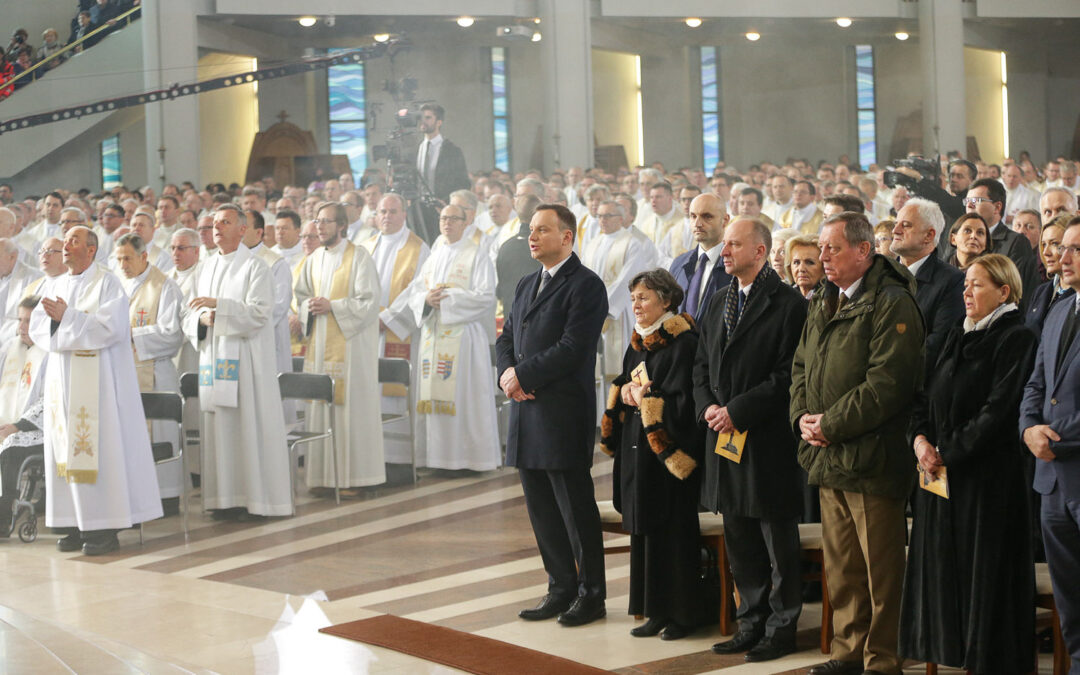Keep our news free from ads and paywalls by making a donation to support our work!

Notes from Poland is run by a small editorial team and is published by an independent, non-profit foundation that is funded through donations from our readers. We cannot do what we do without your support.
By Aleks Szczerbiak (originally published by LSE EUROPP and republished with kind permission)
Poland has traditionally had very high levels of religiosity and the church played a crucial role in the collapse of communism in 1989. But does religion still matter to Polish politics today? Aleks Szczerbiak writes that, while the church remains a totemic force in Polish society, the relationship between parties and religion in post-communist Poland is a complex one.
My new book, published at the end of November, examines the role of religion and the Catholic church in post-communist Polish politics as seen through the lens of political parties’ relations with the church and how they have used the religious-secular divide to mobilise support.
Poland has traditionally had very high levels of religiosity, and the church played a crucial historical role, notably in the process that led to the collapse of communism in 1989.
In post-communist Poland, the church and lay religious organisations were rare, exceptional examples of unusually powerful and well-organised civil society actors, a factor that led initially to the Polish episcopate’s overt involvement in politics and created an incentive for parties to link up with it as a source of resources and support.
The church’s power peaked in the early post-1989 period. Since then, it has seen a decline in its influence and prestige, in part due to the church’s overt political involvement and a series of scandals, together with the fact that Polish society has been undergoing a process of “privatisation” of religious practice and secularisation, especially among younger Poles.
A growing number of Poles are turning away from the Catholic church, but not from religious belief itself.
This creates challenges for the church, but also for Polish identity, which has historically been linked to Catholicism, writes Katarzyna Skiba https://t.co/udWGzd0X7F
— Notes from Poland 🇵🇱 (@notesfrompoland) April 18, 2023
Nonetheless, many remained “culturally” Catholic and continued to choose Catholicism as an important sphere of their lives and identity marker.
The church is thus not simply a religious institution but still plays a significant role in Polish politics. It can react forcefully to perceived threats to its values and interests, and retains the capacity to set the terms of public debate and influence policymaking on key social issues such as abortion and the legal status of same-sex couples.
Moreover, over time, leading elements within the church adopted more subtle political strategies, acting more as a powerful interest group that governments had to consider and a crucial point of reference around which parties orient their strategies.
It particularly utilised the well-organised milieu clustered around the influential “religious right” Catholic Radio Maryja media conglomerate and social movement as its informal “political arm”.
Promoting Christian values while retaining strategic flexibility
There is, however, great complexity in the relationship between the church and Polish parties.
Both sides of the political divide defined themselves in relation to and positioned themselves on the religious issue to mobilise support from and appeal to specific segments of the electorate.
Some right-wing parties, for example, sought to actively associate themselves with the church’s moral authority and openly promoted its socio-political agenda to mobilise a conservative religious electorate by presenting themselves as defenders of traditional Christian values and national identity.
If Poland is to have a future, attacks on the Catholic church must not be tolerated, says Kaczyński.
"We must reject those trying to destroy Poland, collaborating with external enemies," he warned after a mass marking the anniversary of his mother's death https://t.co/f6KOJ0jdvy
— Notes from Poland 🇵🇱 (@notesfrompoland) January 17, 2022
These included openly clerical-nationalist parties such as the Christian-National Union (ZChN) and League of Polish Families (LPR) that were moderately electorally successful junior governing parties in the 1990s and early-to-mid 2000s respectively, but also (particularly after 2004) the right-wing Law and Justice (PiS), Poland’s ruling party between 2005-7 and 2015-23 and currently the main opposition grouping.
However, the case of Law and Justice also illustrates that even more successful pro-clerical parties do not want to narrow their appeal by putting off more secular voters and depriving themselves of greater strategic flexibility by tying themselves too closely to the church.
For a period in the early-to-mid 2000s, Poland’s current governing party, Civic Platform (now renamed the Civic Coalition – KO), represented a variation on this strategy.
So too did the Polish People’s Party (PSL), a successor to a communist “satellite” party that claims roots in the 19th-century agrarian movement and was a minor governing party in coalitions with left-wing and liberal parties throughout much of the post-communist period.
Moreover, none of those parties that bore (or appeared to bear) some resemblance to the Christian Democracy party family were successful, while no successful right-wing or centre-right party could be objectively labelled as such.
This was partly because the specific historical factors and conditions that were crucial to the formation of successful Christian Democratic parties in western Europe were largely absent in Poland.
At the same time, the church hierarchy was able to achieve virtually all of its initial political objectives without having to throw its moral weight and resources unambiguously behind a single pro-clerical party, Christian Democratic or otherwise.
To a greater or lesser extent, for a long time virtually every Polish centre-right party stressed its commitment to Christian values and promoted policies sympathetic to the church’s social teaching and political agenda.
Mobilising secularism and anti-clericalism
At the same time, many Poles opposed key elements of the church’s public policy agenda, and its perceived political involvement inadvertently contributed to the development of an anti-clerical backlash.
As a consequence, there were also parties that sought to mobilise political support around secularism, in some cases bordering on open anti-clericalism, by appealing to more liberal-left voters who believe that the church has excessive influence on politics, particularly in relation to moral-cultural issues.
Notable among these was the communist successor Democratic Left Alliance (SLD), Poland’s main governing party for much of the 1990s, and its own organisational successor the New Left (Nowa Lewica), which has been a junior coalition partner in the KO-led government since 2023.
The Left has set out plans to end the "toxic relationship" between church and state
It includes ending Catholic catechism classes in schools, abolishing the crime of offending religious feelings, banning exorcisms on minors and renegotiating the concordat https://t.co/n7TAMPlu6w
— Notes from Poland 🇵🇱 (@notesfrompoland) July 31, 2023
Another significant “secularist”, arguably overtly anti-clerical, grouping was the socially liberal Palikot Movement (RP), formed by the one-time leading Civic Platform parliamentarian Janusz Palikot, and briefly successful in the early 2010s.
Although the Palikot Movement was short-lived and no party emerged subsequently to mobilise solely around the issue of anti-clericalism, calls for a secular, “worldview neutral” state and a socially liberal policy agenda have become key identity markers for the Polish left.
The clerical-secular divide based on religiosity and attitudes towards the role of the church in public life and its social and political agenda was thus a major source of political divisions in post-1989 Poland.
Initially, this religious divide was a key element of, and often closely intertwined with, attitudes towards the communist past to produce a broader “post-communist divide”. This broadly distinguished those parties and voters with roots in the Solidarity opposition movement (often more pro-church and conservative) from those associated with the former communist regime (often more secular and liberal).
A long-term decline in trust in the Catholic church in Poland has accelerated over the last year, with only 35% of Poles now saying they trust the church.
Meanwhile, the armed forces now enjoy record-high trust of 94% https://t.co/ErCBE4HwWR
— Notes from Poland 🇵🇱 (@notesfrompoland) September 17, 2025
The impact of these moral-cultural issues was, initially at least, more salient to voters than traditional socio-economic questions.
But even after the salience of the “post-communist divide” faded in the mid-2000s with the emergence of the Civic Platform-Law and Justice duopoly, religiosity and attitudes towards the church’s role in public life continued to function as a deep moral-cultural divide within Polish society and key determinant of left-right self-placement – and, therefore, party identification and voting behaviour.
To this day, this continues to shape the political landscape and define the core left and right electorates.
A deep (but slowly fading?) moral-cultural faultline
In essence, despite secularisation and a decline in the church’s influence and prestige, it remains a totemic force whose stance on key moral-cultural issues heavily influences public discourse and government actions. It also retains the capacity to react forcefully to attempts to introduce reforms perceived as a threat to its core values and interests.
Nonetheless, the relationship between parties and religion in post-communist Poland is a complex one. The religious-secular divide is not, and never has been, the sole axis of party competition and there has never been a strong Christian Democratic party of the kind found in western Europe.
Religion has affected Polish parties by acting as a significant and fundamental moral-cultural faultline that has interacted with other social and historical divides to influence party strategies and shape the structure of political competition.
Finally, with the recent rise of the radical-right free-market Confederation (Konfederacja) grouping, it is worth noting the emergence of a new, potentially significant, secular right-wing electorate, particularly among younger voters, suggesting changes in how religion influences Polish party politics.
These voters are economically free-market but also socially liberal and do not identify with the institutional church, creating a challenge for more traditional right-wing groupings such as PiS that have relied heavily on their practising Catholic electoral base.

Notes from Poland is run by a small editorial team and published by an independent, non-profit foundation that is funded through donations from our readers. We cannot do what we do without your support.
Main image credit: Krzysztof Sitkowski/KPRP




















